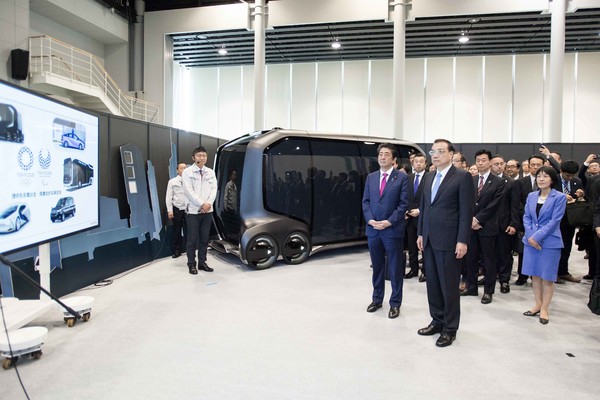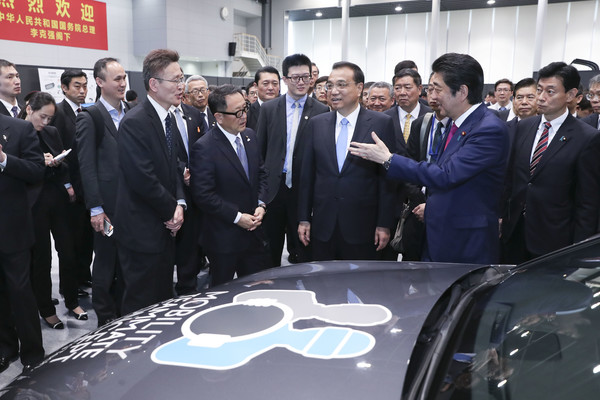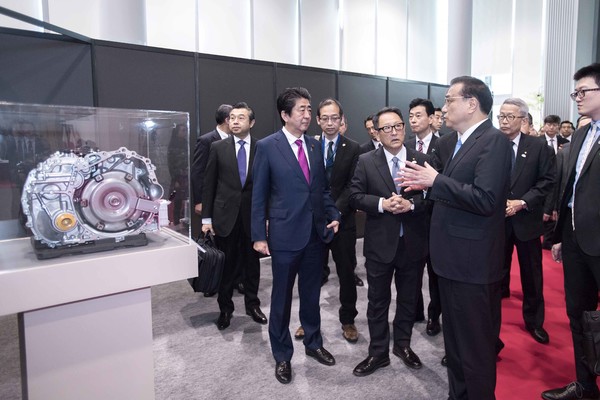
Premier Li Keqiang, accompanied by Japanese Prime Minister Shinzo Abe, visited a Toyota auto factory on Japan’s northern island of Hokkaido on May 11. To welcome Premier Li’s visit, Toyota displayed the most advanced high-tech products in this factory.
“Nowadays, the automotive industry is experiencing a once-in-a-century reform led by China, the fastest-developing country in the world. We will keep up with the times and make all efforts to follow the pace of China,” said Akio Toyoda, president of Toyota Motor Corporation, who, when meeting with Premier Li, expressed a strong desire to cooperate with China.
Premier Li said that China is enhancing innovation system construction. This trip to Japan helped both countries reach consensus to strengthen cooperation and dialogues in innovation, he said.
The Premier expressed the hope that Japanese enterprises, including Toyota, will grasp the chance to further deepen collaboration with China, and upgrade from manufacturing to intelligent manufacturing, thus reaching higher-level mutual benefit.

A visit consisting of Q&As
The nearly one-hour-long visit teemed with Q&As between the Premier and the R&D staff. When looking over multifunctional travel platform products, Premier Li focused on their R&D philosophies and design details. He also inquired about hydrogen fuel cell vehicles.
When visiting the autonomous vehicle display area, Abe told Premier Li that Japan has already started to test autonomous driving technology on high-speed railroads with light traffic.
“Premier Li Keqiang is quite concerned about emerging technologies and expressed his interest in this field,” the Japan’s Kyodo News quoted Akio Toyoda.
“How can a narrow street accommodate a multifunctional travel platform larger than a normal taxi? Are the tires ordinary or tailor-made with various road conditions taken into account? Does its battery endurance entail further enhancement to work around the clock?” Premier Li asked the R&D staff.

Learning that travel platform products are aimed at carrying forward the philosophy of sharing vehicles, integrating transportation, retail, delivery and medical services, Premier Li said that this brand-new design philosophy not only benefits individuals but also helps with social problems, including traffic jams and environmental pollution.
“I deem it the most pressing matter to raise efficiency and lower cost to popularize these products on a large scope,” Premier Li said, a comment that was echoed by Akio Toyoda and Abe.

New opportunities from China-Japan reciprocal cooperation
When watching a snippet from an introductory video about a Toyota-developed self-driving car tested on a Japanese highway, Premier Li was told by the staff that part of the credit goes to the R&D cooperation between Toyota and a Chinese university.
In response, Premier Li said, “We hope Toyota will establish an R&D center with more Chinese universities, in a bid to deepen cooperation on R&D and innovation, and launch competitive high-tech products that meet the demands of both markets and third-party markets. The Chinese government will effectively protect intellectual property.”
Toyota, one of the top 10 global carmakers and the largest car-making firm in Japan, has established more than 20 sole proprietorships and jointly-invested enterprises, boasting a workforce of over 40,000 in China.
Prior to the visit, Premier Li and Abe attended the opening ceremony of the China-Japan Governor Forum, during which the Premier said that a slew of cooperation agreements had been inked, creating conditions and room for regional and business cooperation between the two countries. China and Japan agreed to carry out innovation cooperation and establish an innovative dialogue mechanism to advance cooperation in high-tech technologies while strictly protecting intellectual property.
Kyodo News commented that Premier Li welcomes Japanese enterprises to China, calls for further investments from Japan, and attaches great importance to enterprises’ technological innovation capacity.
In a signed article in Japanese newspaper Asahi Shimbun, Premier Li said China and Japan are highly complementary economies. Against the backdrop of a new wave of technological and industrial revolution, there is substantial potential for bilateral cooperation in terms of energy-saving, technological innovation, high-end manufacturing, finance, sharing economy, and more.
Business communities of the two countries also enjoy broad prospects for third-market cooperation. New opportunities for China-Japan win-win cooperation are coming to the fore, he wrote in the article.
